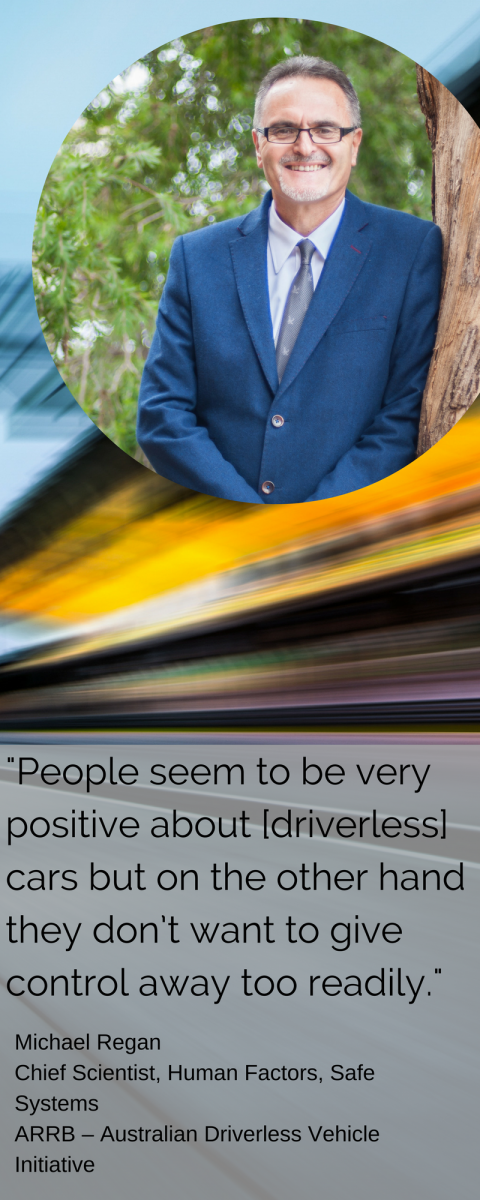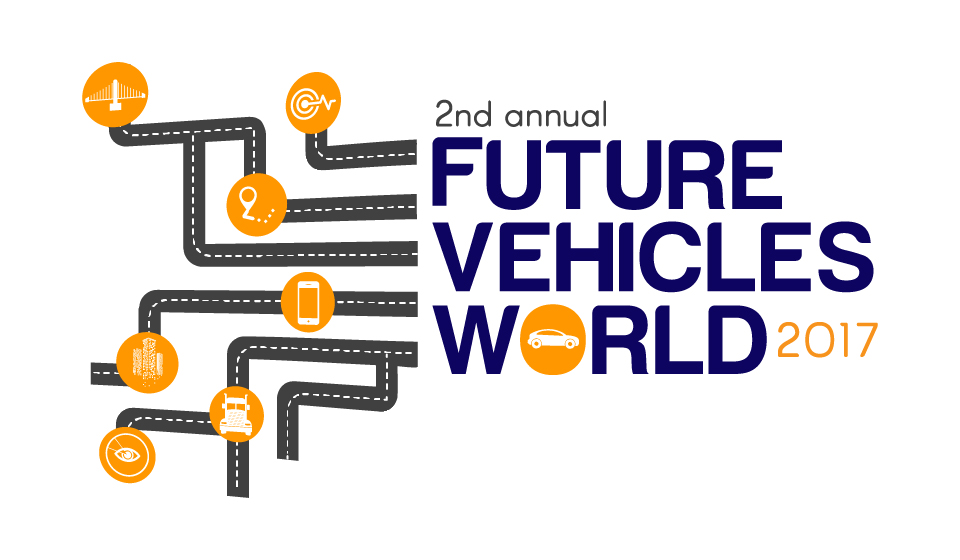Interview with: Professor Mike Regan, Chief Scientist-Human Factors, Australian Road Research Board
and Mitchell Cunningham, Behavioural Scientist- Human Factors, Australian Road Research Board (ARRB)
 You were a part of the first ADVI National Survey which was completed last November, could you explain a little more about the survey?
You were a part of the first ADVI National Survey which was completed last November, could you explain a little more about the survey?
This was Australia’s first national survey of public opinion about automated and driverless vehicles. It was funded by ADVI – the Australian Driverless Vehicle Initiative - and developed by a sub-group of ADVI members – The Australian Road Research Board (who led the survey), the UNSW Centre for Integrated Transport Innovation, Main Roads WA, The Monash University Accident Research Centre, AECOM, Suncorp and the Defence Science and Technology Group.
We sent out the survey to a representative sample of 5200 Australians, aged 18 and above. We have almost exactly equal numbers of males and females and about 90% of participants had a driver’s license.
The main aim was to gauge driver awareness and opinions and the likely acceptance of automated and driverless cars.
What was the most exciting thing? What were the key findings?
I think probably the most exciting thing for us was that even though less than 10% of Australians admitted to having driven a car that drives itself in some situations, almost 40% of them said they would pay more for a driverless car than for their current car. People were quite positive about the driverless future even though few people have experienced a driverless car. I think that was the most exciting thing for us.
The other thing too that came out was that almost half of the sample thought that the driverless car would be able to drive as safely as a human. I think that’s a fairly positive attitude for people that have hardly ever experienced these vehicles and know little or nothing about them.
Australia is a country of early adopters of technology and maybe that’s why on the whole people are pretty positive.
Key findings from key questions asked:
1. Nearly 50% of people think that a self-driving car will be safer than a human driver while only 25% disagree. So people seem quite positive about automated vehicles and at least feel that they’re likely to be safe or at least safer than a human.
2. We asked people what they thought would be the greatest benefit of self-driving cars and there were 3 things that they thought would be the greatest benefit.
- Firstly they thought that there would be a huge benefit to people that are mobility impaired or disabled. In fact, 82% of respondents thought that would be the main benefit of self-driving vehicles.
- The 2nd greatest perceived benefit was reduced insurance premiums with 62% of respondents finding this very beneficial. We believe this was impacted through hearing from the media that these vehicles would have improved safety and crash less and so on.
- As a corrobboree to that, 61% thought vehicle repair costs would be reduced
The fourth main benefit was that people thought they would have more time to do other things. Where 56% of people thought they would have more time to do other things and this would be the greatest benefit.
3. What they are most likely to do, or what are they most likely to want to do.
- And most people, 78%, said they would want to observe scenery, look out the window.
- The second thing, 76% of people said they most want to interact with passengers.
- The third greatest thing that they would be most likely to do – would want to be eating and drink.
- And the fourth most likely thing that they would want to do is nothing at all.
I was a bit taken aback by this: only 32% said they would want to work in a car. I thought that was interesting. It sounds like at the moment they want to have the pleasure of not having to drive.
4. What are people most likely to want to use self-driving cars for?
- They want to use them to sleep. 76% said they would want to use them when they’re fatigued or tired so they can sleep.
- After that they want to use self-driving vehicles when they’re physically or mentally incapacitated; having these cars will help those problems.
- The 3rd most desired use was when they’re feeling uncomfortable to drive - 62% said they would want to use self-driving cars when they felt uncomfortable to drive.
5. What people are most concerned about.
- The thing that 92% of people were most concerned about is being legally and financially responsible if the car crashes or makes a mistake. But the main one liability if the car crashed or makes a mistake.
- The second biggest concern was letting their kids ride by themselves with 90% of people saying they would be concerned about letting their kids ride by themselves in a car without a driver.
- Thirdly, which we thought would be higher up, was 80% of respondents sighting the ability to drive safely as a concern.
- Cybersecurity came after hacking etc. People know quite a bit about that so they were worried about that. I think that was roughly 80%.
6. We also asked people in a future where all cars become driverless whether they would still like to be able to drive a car. On the one hand people seem to very positive about cars but on the other hand, they don’t want to give control away too readily.
People are much more comfortable about taking control back from driverless mode than giving it to the automated vehicle. 86% are comfortable taking control from the car and 65% are comfortable in giving it back when the car requests to take back control from the driver, so there’s a bit of a control issue.
7. How comfortable would people feel about driverless cars being used for public transport?
Only 43% said they would feel comfortable to travel in a car with no driver and only 46% were comfortable to share one of those cars with other people. We talk about a future with car sharing,however only 46% of people would be comfortable to do that.
8. The final question we asked was whether people would actually want to buy a fully self-driving car.
And what we found was that only 38% of people are willing to pay more for a fully self-driving car than their current car. Of that 38% that are willing to pay more, they’re only willing to, on average, pay about $9K more.
As I said, these sorts of things might change with people becoming more comfortable with technology. It’s giving us a good baseline of data to determine how the community feels and that’s why it’s important to have this. It’s not conjecture, - it’s how people actually think at this point in time.
But our survey shows that people have had very little exposure to highly automated vehicles. So their opinions are likely to change over time. That’s why we plan to repeat the survey every year or so, so we can track the changes.
What we have to realise at this stage is that the majority of people don’t really want to pay much more. The industry is investing all this money in producing driverless cars that are only going to be adopted by people who are willing to pay up to $9K more.
Professor Mike Regan will be joining a number of industry experts for the Future Vehicles World conference in May.
Download the conference agenda here for more details.
